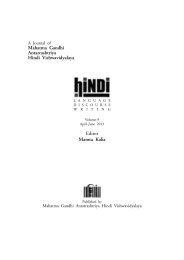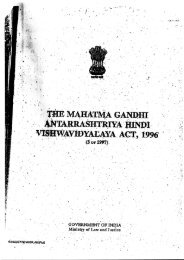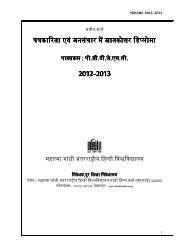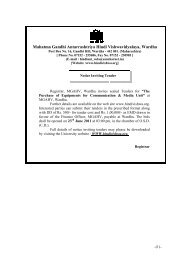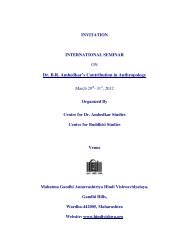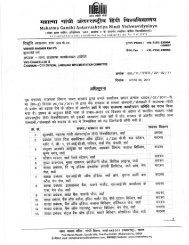A Journal of Mahatma Gandhi Antarrashtriya Hindi Vishwavidyalaya
A Journal of Mahatma Gandhi Antarrashtriya Hindi Vishwavidyalaya
A Journal of Mahatma Gandhi Antarrashtriya Hindi Vishwavidyalaya
You also want an ePaper? Increase the reach of your titles
YUMPU automatically turns print PDFs into web optimized ePapers that Google loves.
Sahai, Nagendra, Bhagwat Sharan Upadhyay<br />
and Ram Swarup Chaturvedi recognized<br />
Agyeya as a revolutionary writer. Many<br />
<strong>Hindi</strong> critics, a huge number <strong>of</strong> <strong>Hindi</strong> readers<br />
and students have liked ‘Shekhar : Ek Jivani’<br />
very much and this is corroborated by<br />
the fact that this novel is still popular<br />
among young generation and many young<br />
researchers have re-discovered many<br />
nuances <strong>of</strong> this novel in many universities<br />
<strong>of</strong> India and abroad.<br />
It is notable that Agyeya openly spoke<br />
for individual freedom at any cost and<br />
he evaluated any person, organisation,<br />
government or society by this parameter.<br />
Once he vividly remarked, “Freedom is<br />
the foundation wall <strong>of</strong> other values.<br />
Freedom is the goal <strong>of</strong> human being as<br />
well as the evidence <strong>of</strong> his humanity.”<br />
Shekhar, the hero <strong>of</strong> the novel, is as much<br />
modern and revolutionary as Agyeya<br />
himself was. Since his very childhood he<br />
was a rebel and negated worldly comforts<br />
and desired the liberation <strong>of</strong> the self from<br />
the worldly comforts and also desired the<br />
liberation <strong>of</strong> the self from the worldly<br />
affairs. Needless to say that the sources<br />
<strong>of</strong> his revolt are existentialism and<br />
modernism - and these are obviously<br />
associated with romanticism. He used to<br />
be bored with the short stories with moral<br />
teachings. He did not consider anything<br />
impossible, sinful or unethical. In this novel<br />
the patriarchy has been challenged in<br />
different ways as the hero openly states<br />
to destroy the conspiracy <strong>of</strong> distrust in<br />
women and <strong>of</strong> considering them as sinful.<br />
The educated heroine, Shashi, is married<br />
to an administrative <strong>of</strong>ficer, Rameshwar,<br />
despite her unwillingness. Once Shashi stays<br />
at night with her cousin (Shekhar) and<br />
therefore her husband and in-laws blame<br />
her <strong>of</strong> loose character and oust her from<br />
their house. Her kidney gets damaged due<br />
to Rameshwar’s beating and kicking and<br />
later she dies. Thus the cruel patriarchal<br />
system destroys the intellect, freedom and<br />
dignity <strong>of</strong> a woman. However, it is surprising<br />
that the novelist depicts Shekhar’s character<br />
as a revolutionary rather than Shashi’s<br />
when the latter stays at night with the<br />
former. Further despite her unwillingness<br />
Shashi was married to Rameshwar at the<br />
advice <strong>of</strong> her mother and when she went<br />
to Shekhar for blessing, he was annoyed.<br />
But <strong>of</strong>ten Shekhar thinks <strong>of</strong> her welfare<br />
in order to prove his greatness - and<br />
this fact corroborates his individualistic<br />
existentialism. Similarly, when Shekhar goes<br />
to a prostitute and a half - naked girl<br />
begs him for money by catching hold <strong>of</strong><br />
him, he, seeing flowers <strong>of</strong> kumud being<br />
sold nearby, suddenly remembers the<br />
natural beauty <strong>of</strong> Kashmir and runs away<br />
from there. Here he does not question<br />
and revolt against the social evil <strong>of</strong><br />
prostitution-which symbolises patriarchy—<br />
rather he simply escapes. This shows the<br />
cowardice <strong>of</strong> the hero because he is an<br />
angry youngman as in most <strong>of</strong> <strong>Hindi</strong> movies<br />
but his anger is not properly channelised<br />
for a cause <strong>of</strong> major social change. Actually<br />
his rebel character does not struggle with<br />
the existing circumstances <strong>of</strong> exploitation<br />
and subordination. His words are not<br />
transformed into deeds. Thus there is<br />
January-March 2012 :: 57



